|
SNAP Library, Developer Reference
2012-10-02 12:56:23
SNAP, a general purpose network analysis and graph mining library
|
|
SNAP Library, Developer Reference
2012-10-02 12:56:23
SNAP, a general purpose network analysis and graph mining library
|

Go to the source code of this file.
Classes | |
| class | TExpBi |
Enumerations | |
| enum | TExpValType { evtUndef, evtFlt, evtStr, evtVec, evtLst } |
| enum | TExpFuncArgType { efatUndef, efatVoid, efatFlt, efatFltFlt, efatFltStr, efatStr, efatStrFlt, efatStrStr, efatStrAny } |
| enum | TExpBiId { ebi_Undef, ebi_True, ebi_False, ebi_E, ebi_Pi, ebi_Sin, ebi_Cos, ebi_Tan, ebi_ASin, ebi_ACos, ebi_ATan, ebi_SinH, ebi_CosH, ebi_TanH, ebi_Pow, ebi_Exp, ebi_Sqr, ebi_Sqrt, ebi_Log, ebi_Log10, ebi_Ceil, ebi_Floor, ebi_Int, ebi_Frac, ebi_Abs, ebi_UniDev, ebi_NrmDev, ebi_ExpDev, ebi_GamDev, ebi_PoiDev, ebi_BinDev, ebi_UniDevStep, ebi_NrmDevStep, ebi_ExpDevStep } |
| enum | TExpBiArgType { ebatUndef, ebatVoid, ebatFlt, ebatFltFlt } |
| enum | TExpType { etUndef, etVal, etVec, etLst, etOp, etVar, etBiConst, etFunc, etBiFunc } |
| enum | TExpOp { eoUndef, eoUPlus, eoUMinus, eoPlus, eoMinus, eoMul, eoDiv, eoIDiv, eoMod, eoNot, eoAnd, eoOr, eoEq, eoNEq, eoLss, eoGtr, eoLEq, eoGEq, eoIf } |
| enum | TExpHelpObjType { ehotUndef, ehotOp, ehotVar, ehotFunc, ehotTempl } |
Functions | |
| TExpVal (const TExpValType &_ValType=evtUndef) | |
| TExpVal (const TFlt &_Flt) | |
| TExpVal (const double &_Flt) | |
| TExpVal (const TStr &_Str) | |
| static PExpVal | New (const TExpValType &ValType=evtUndef) |
| static PExpVal | New (const TFlt &Flt) |
| static PExpVal | New (const double &Flt) |
| static PExpVal | New (const TStr &Str) |
| ~TExpVal () | |
| TExpVal (TSIn &SIn) | |
| static PExpVal | Load (TSIn &SIn) |
| void | Save (TSOut &SOut) const |
| TExpVal & | operator= (const TExpVal &) |
| bool | operator== (const TExpVal &ExpVal) const |
| bool | operator< (const TExpVal &ExpVal) const |
| void | AddToVec (const PExpVal &ExpVal) |
| void | AddToLst (const PExpVal &ExpVal) |
| TExpValType | GetValType () const |
| bool | IsFltVal (TFlt &_Flt) const |
| bool | IsFltVal (double &_Flt) const |
| double | GetFltVal () const |
| int | GetFltValAsInt (const bool &ThrowExceptP=true) const |
| TStr | GetStrVal () const |
| void | SaveTxt (TOLx &Lx) const |
| void | SaveTxt (const PSOut &SOut) const |
| TStr | GetStr () const |
| static PExpVal | MkClone (const PExpVal &ExpVal) |
| static PExpVal | GetUndefExpVal () |
| static PExpVal | GetZeroExpVal () |
| TExpEnv () | |
| virtual | ~TExpEnv () |
| TExpEnv (TSIn &SIn) | |
| TExpEnv & | operator= (const TExpEnv &) |
| bool | operator== (const TExpEnv &) const |
| virtual void | PutVarVal (const TStr &, const PExpVal &) |
| virtual PExpVal | GetVarVal (const TStr &, bool &IsVar) |
| virtual PExpVal | GetVarVal (const TStr &VarNm) |
| virtual int | GetVars () const |
| virtual void | GetVarNmVal (const int &, TStr &, PExpVal &) const |
| virtual PExpVal | GetFuncVal (const TStr &, const TExpValV &, bool &IsFunc) |
| virtual TRnd & | GetRnd () |
| static bool | IsFuncOk (const TStr &RqFuncNm, const TExpFuncArgType &RqFuncArgType, const TStr &FuncNm, const TExpValV &ArgValV) |
| static TExpOp | GetExpOpFromLxSym (const TLxSym &LxSym) |
| static TLxSym | GetLxSymFromExpOp (const TExpOp &ExpOp) |
| static PExp | LoadTxtFact (TILx &Lx, const TFSet &Expect) |
| static PExp | LoadTxtMulExp (TILx &Lx, const TFSet &Expect) |
| static PExp | LoadTxtAddExp (TILx &Lx, const TFSet &Expect) |
| static PExp | LoadTxtRelExp (TILx &Lx, const TFSet &Expect) |
| static PExp | LoadTxtExp (TILx &Lx, const TFSet &Expect) |
| void | SaveTxtOp (TOLx &Lx) const |
| PExpVal | EvalExpOp (const PExpEnv &ExpEnv, const bool &DbgP, TChA &DbgChA) |
| PExpVal | EvalExp (const PExpEnv &ExpEnv, const bool &DbgP, TChA &DbgChA) |
| TExp (const TExpType &_ExpType=etUndef) | |
| TExp (const TExpOp &_ExpOp, const PExp &Exp1, const PExp &Exp2=NULL, const PExp &Exp3=NULL) | |
| TExp (const PExpVal &_ExpVal) | |
| TExp (const TStr &_VarNm) | |
| TExp (const TStr &_FuncNm, const TExpV &_ArgExpV) | |
| ~TExp () | |
| TExp (TSIn &SIn) | |
| TExp & | operator= (const TExp &) |
| bool | operator== (const TExp &) const |
| static bool | IsExpStrOk (const TStr &ExpStr, TStr &MsgStr) |
| static PExp | LoadTxt (const PSIn &SIn, bool &Ok, TStr &MsgStr, const TFSet &Expect=TFSet()|syEof) |
| static PExp | LoadTxt (const TStr &ExpStr, bool &Ok, TStr &MsgStr) |
| static PExp | LoadTxt (const TStr &ExpStr) |
| TStr | GetTopObjNm () const |
| int | GetArgExps () const |
| TStr | GetArgExpStr (const int &ArgExpN) const |
| PExpVal | Eval (bool &Ok, TStr &MsgStr, const bool &DbgP, TStr &DbgStr, const PExpEnv &ExpEnv=TExpEnv::DfExpEnv) |
| PExpVal | Eval (const PExpEnv &ExpEnv=TExpEnv::DfExpEnv) |
| PExpVal | Eval (bool &Ok, TStr &MsgStr, const PExpEnv &ExpEnv=TExpEnv::DfExpEnv) |
| PExpVal | Eval (const PExpEnv &ExpEnv, const bool &DbgP, TStr &DbgStr) |
| static PExpVal | LoadAndEvalExpL (const TStr &ExpLStr, bool &Ok, TStr &MsgStr, const PExpEnv &ExpEnv=TExpEnv::DfExpEnv) |
| static TStr | GetExpTypeStr (const TExpType &ExpType) |
| static TStr | GetExpOpStr (const TExpOp &ExpOp) |
| static void | GetBiDescV (TStrPrV &BiDescV) |
| TExpHelpItem () | |
| TExpHelpItem (const TStr &_Nm, const TStr &_TypeStr, const TStr &_DescStr, const TStr &_DfValStr) | |
| static PExpHelpItem | New (const TStr &Nm, const TStr &TypeStr, const TStr &DescStr, const TStr &DfValStr) |
| ~TExpHelpItem () | |
| TExpHelpItem (TSIn &SIn) | |
| TExpHelpItem & | operator= (const TExpHelpItem &) |
| bool | operator== (const TExpHelpItem &) const |
| TStr | GetNm () const |
| TStr | GetTypeStr () const |
| TStr | GetDescStr () const |
| TStr | GetDfValStr () const |
| TExpHelpObj () | |
| TExpHelpObj (const TExpHelpObjType &_Type, const TStr &_CatNm, const PExpHelpItem &_HdItem, const TExpHelpItemV &_ArgItemV) | |
| static PExpHelpObj | New (const TExpHelpObjType &Type, const TStr &CatNm, const PExpHelpItem &HdItem, const TExpHelpItemV &ArgItemV=TExpHelpItemV()) |
| ~TExpHelpObj () | |
| TExpHelpObj (TSIn &SIn) | |
| TExpHelpObj & | operator= (const TExpHelpObj &) |
| bool | operator== (const TExpHelpObj &) const |
| TExpHelpObjType | GetType () const |
| TStr | GetCatNm () const |
| PExpHelpItem | GetHdItem () const |
| int | GetArgItems () const |
| PExpHelpItem | GetArgItem (const int &ArgItemN) const |
| TStr | GetHdArgNmStr () const |
| static TExpHelpObjType | GetObjTypeFromStr (const TStr &TypeStr) |
| TExpHelp () | |
| static PExpHelp | New () |
| ~TExpHelp () | |
| TExpHelp (TSIn &SIn) | |
| TExpHelp & | operator= (const TExpHelp &) |
| bool | operator== (const TExpHelp &) const |
| static PExpHelp | LoadXml (const PSIn &SIn) |
| static PExpHelp | LoadXml (const TStr &FNm) |
| void | AddObj (const PExpHelpObj &Obj) |
| void | GetCatNmV (TStrV &CatNmV) const |
| void | GetObjHdNmV (const TStr &CatNm, TStrV &ObjHdNmV) const |
| PExpHelpObj | GetObj (const TStr &ObjNm) const |
Variables | |
| static ClassTPVL(TExpVal, PExpVal, TExpValV, TExpValL, TExpValLN) private PExpVal | ZeroExpVal = NULL |
| TInt | ValType |
| TAscFlt | Flt |
| TStr | Str |
| TExpValV | ValV |
| TExpValL | ValL |
| static PExpEnv | DfExpEnv = PExpEnv(new TExpEnv()) |
| ClassTPV(TExp, PExp, TExpV) private TInt | ExpType |
| TBool | IsParen |
| PExpVal | ExpVal |
| TStr | ExpNm |
| TInt | ExpOp |
| TInt | ExpBiId |
| TExpV | ArgExpV |
| static const TFSet | MulOpSymSet |
| static const TFSet | UAddOpSymSet |
| static const TFSet | AddOpSymSet |
| static const TFSet | RelOpSymSet |
| static const TFSet | FactExpExpect |
| static const TFSet | MulExpExpect |
| static const TFSet | AddExpExpect |
| static const TFSet | RelExpExpect |
| static const TFSet | ExpExpect |
| ClassTPV(TExpHelpItem, PExpHelpItem, TExpHelpItemV) private TStr | TypeStr |
| TStr | DescStr |
| TStr | DfValStr |
| ClassTPV(TExpHelpObj, PExpHelpObj, TExpHelpObjV) private TStr | CatNm |
| PExpHelpItem | HdItem |
| TExpHelpItemV | ArgItemV |
| enum TExpBiArgType |
Definition at line 132 of file exp.h.
{
ebatUndef, ebatVoid, ebatFlt, ebatFltFlt
} TExpBiArgType;
| enum TExpBiId |
Definition at line 108 of file exp.h.
{
// constants
ebi_Undef, ebi_True, ebi_False, ebi_E, ebi_Pi,
// trigonometric funcions
ebi_Sin, ebi_Cos, ebi_Tan,
ebi_ASin, ebi_ACos, ebi_ATan,
ebi_SinH, ebi_CosH, ebi_TanH,
// exponential functions
ebi_Pow, ebi_Exp, ebi_Sqr, ebi_Sqrt,
ebi_Log, ebi_Log10,
// number manipulation functions
ebi_Ceil, ebi_Floor, ebi_Int, ebi_Frac, ebi_Abs,
// random deviates
ebi_UniDev, ebi_NrmDev, ebi_ExpDev,
ebi_GamDev, ebi_PoiDev, ebi_BinDev,
ebi_UniDevStep, ebi_NrmDevStep, ebi_ExpDevStep,
} TExpBiId;
| enum TExpFuncArgType |
| enum TExpHelpObjType |
| enum TExpOp |
| enum TExpType |
| enum TExpValType |
| void AddToLst | ( | const PExpVal & | ExpVal | ) |
| void AddToVec | ( | const PExpVal & | ExpVal | ) |
| PExpVal TExp::Eval | ( | bool & | Ok, |
| TStr & | MsgStr, | ||
| const bool & | DbgP, | ||
| TStr & | DbgStr, | ||
| const PExpEnv & | ExpEnv = TExpEnv::DfExpEnv |
||
| ) |
Definition at line 898 of file exp.cpp.
References EvalExp(), ExpVal, GetStr(), GetUndefExpVal(), and MsgStr.
Referenced by Eval().
{
Ok=true; MsgStr="Ok";
PExpVal ExpVal; TChA DbgChA;
if (DbgP){DbgChA+="Debug Expression: ";}
try {
ExpVal=EvalExp(ExpEnv, DbgP, DbgChA);
}
catch (PExcept E){
Ok=false; MsgStr=E->GetMsgStr();
}
if (!Ok){return TExpVal::GetUndefExpVal();}
if (DbgP){
DbgChA+='['; DbgChA+=GetStr(); DbgChA+=" -> ";
DbgChA+=ExpVal->GetStr(); DbgChA+="] "; DbgChA+=MsgStr;
DbgStr=DbgChA;
}
return ExpVal;
}
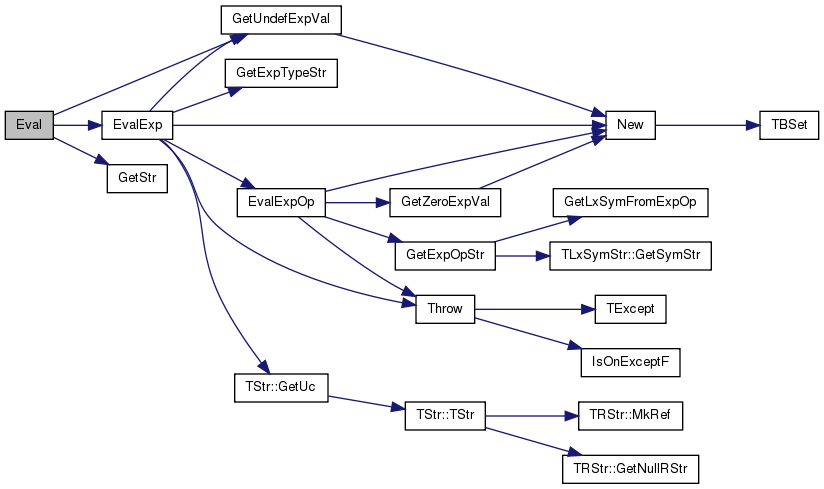

| PExpVal Eval | ( | const PExpEnv & | ExpEnv = TExpEnv::DfExpEnv | ) |
| PExpVal Eval | ( | bool & | Ok, |
| TStr & | MsgStr, | ||
| const PExpEnv & | ExpEnv = TExpEnv::DfExpEnv |
||
| ) |
| PExpVal TExp::EvalExp | ( | const PExpEnv & | ExpEnv, |
| const bool & | DbgP, | ||
| TChA & | DbgChA | ||
| ) | [private] |
Definition at line 517 of file exp.cpp.
References ArgExpV, etBiConst, etBiFunc, etFunc, etLst, etOp, etUndef, etVal, etVar, etVec, EvalExpOp(), evtLst, evtVec, ExpBiId, ExpNm, ExpType, ExpVal, Fail, GetExpTypeStr(), TStr::GetUc(), GetUndefExpVal(), New(), and Throw().
Referenced by Eval().
{
PExpVal OutExpVal;
TExpType _ExpType=TExpType(int(ExpType));
switch (_ExpType){
case etUndef:
OutExpVal=TExpVal::GetUndefExpVal();
break;
case etVal:
OutExpVal=ExpVal;
break;
case etVec:{
PExpVal ExpVal=TExpVal::New(evtVec);
for (int ArgExpN=0; ArgExpN<ArgExpV.Len(); ArgExpN++){
PExpVal ArgExpVal=
PExpVal(ArgExpV[ArgExpN]->EvalExp(ExpEnv, DbgP, DbgChA));
ExpVal->AddToVec(ArgExpVal);
}
OutExpVal=ExpVal;
break;}
case etLst:{
PExpVal ExpVal=TExpVal::New(evtLst);
for (int ArgExpN=0; ArgExpN<ArgExpV.Len(); ArgExpN++){
PExpVal ArgExpVal=
PExpVal(ArgExpV[ArgExpN]->EvalExp(ExpEnv, DbgP, DbgChA));
ExpVal->AddToLst(ArgExpVal);
}
OutExpVal=ExpVal;
break;}
case etOp:
OutExpVal=EvalExpOp(ExpEnv, DbgP, DbgChA); break;
case etVar:{
bool IsVar=false;
PExpVal ExpVal=ExpEnv->GetVarVal(ExpNm.GetUc(), IsVar);
if (!IsVar){TExcept::Throw(TStr("Variable not defined (")+ExpNm+").");}
OutExpVal=ExpVal;
break;}
case etBiConst:
OutExpVal=ExpBi.GetBiConstVal(TExpBiId(int(ExpBiId)));
break;
case etFunc:
case etBiFunc:{
TExpValV ArgExpValV(ArgExpV.Len(), 0);
for (int ArgExpN=0; ArgExpN<ArgExpV.Len(); ArgExpN++){
PExpVal ArgExpVal=
PExpVal(ArgExpV[ArgExpN]->EvalExp(ExpEnv, DbgP, DbgChA));
ArgExpValV.Add(ArgExpVal);
}
switch (_ExpType){
case etFunc:{
bool IsFunc=false;
PExpVal ExpVal=ExpEnv->GetFuncVal(ExpNm.GetUc(), ArgExpValV, IsFunc);
if (!IsFunc){
TExcept::Throw(TStr("Function not defined (")+ExpNm+").");}
OutExpVal=ExpVal;
break;}
case etBiFunc:
OutExpVal=ExpBi.GetBiFuncVal(TExpBiId(int(ExpBiId)), ArgExpValV, ExpEnv);
break;
default: Fail; OutExpVal=NULL;
}
break;}
default: Fail; OutExpVal=NULL;
}
if (DbgP){
switch (_ExpType){
case etVal:
case etOp:
break;
case etUndef:
case etVec:
case etLst:{
TStr ExpTypeStr=TExp::GetExpTypeStr(_ExpType);
DbgChA+='['; DbgChA+=ExpTypeStr; DbgChA+='=';
DbgChA+=OutExpVal->GetStr(); DbgChA+="] ";
break;}
case etVar:
case etBiConst:
case etFunc:
case etBiFunc:
DbgChA+='['; DbgChA+=ExpNm; DbgChA+='=';
DbgChA+=OutExpVal->GetStr(); DbgChA+="] ";
break;
default: Fail;
}
}
return OutExpVal;
}
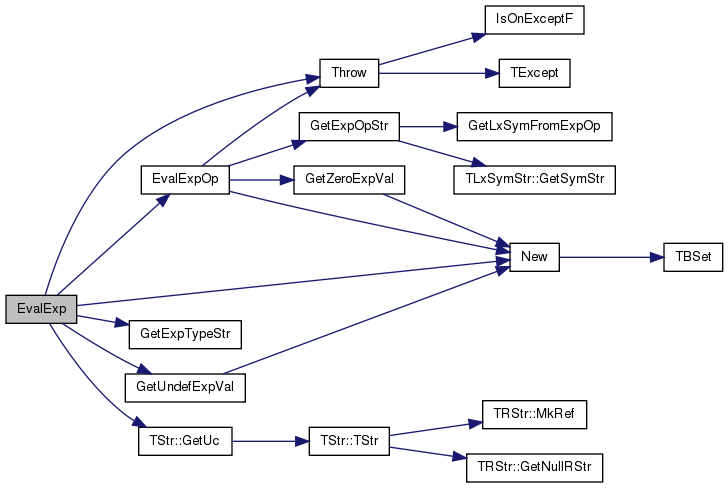

| PExpVal TExp::EvalExpOp | ( | const PExpEnv & | ExpEnv, |
| const bool & | DbgP, | ||
| TChA & | DbgChA | ||
| ) | [private] |
Definition at line 377 of file exp.cpp.
References ArgExpV, eoAnd, eoDiv, eoEq, eoGEq, eoGtr, eoIDiv, eoIf, eoLEq, eoLss, eoMinus, eoMod, eoMul, eoNEq, eoNot, eoOr, eoPlus, eoUMinus, eoUPlus, evtFlt, evtStr, ExpOp, ExpVal, Fail, Flt, GetExpOpStr(), GetZeroExpVal(), New(), Str, and Throw().
Referenced by EvalExp().
{
PExpVal OutExpVal;
TExpOp _ExpOp=TExpOp(int(ExpOp));
switch (_ExpOp){
case eoUPlus:
case eoUMinus:
case eoNot:{
PExpVal ExpVal=ArgExpV[0]->EvalExp(ExpEnv, DbgP, DbgChA);
TExpValType ExpValType=ExpVal->GetValType();
if (ExpValType==evtFlt){
TFlt Flt;
switch (_ExpOp){
case eoUPlus: Flt=ExpVal->GetFltVal(); break;
case eoUMinus: Flt=-ExpVal->GetFltVal(); break;
case eoNot: Flt=double(ExpVal->GetFltValAsInt()==0);
default: Fail; Flt=0;
}
OutExpVal=TExpVal::New(Flt);
} else {
TExcept::Throw("Bad argument types.");
}
break;}
case eoPlus:
case eoMinus:
case eoMul:
case eoDiv:
case eoIDiv:
case eoMod:
case eoAnd:
case eoOr:{
PExpVal LExpVal=ArgExpV[0]->EvalExp(ExpEnv, DbgP, DbgChA);
PExpVal RExpVal=ArgExpV[1]->EvalExp(ExpEnv, DbgP, DbgChA);
TExpValType LExpValType=LExpVal->GetValType();
TExpValType RExpValType=RExpVal->GetValType();
if ((LExpValType==evtFlt)&&(RExpValType==evtFlt)){
// check left expression
double LVal=LExpVal->GetFltVal();
int LValExpon; frexp(LVal, &LValExpon);
if (LValExpon>150){LExpVal=TExpVal::GetZeroExpVal();}
// check right expression
double RVal=LExpVal->GetFltVal();
int RValExpon; frexp(RVal, &RValExpon);
if (RValExpon>150){RExpVal=TExpVal::GetZeroExpVal();}
// calculate
TFlt Flt;
switch (_ExpOp){
case eoPlus: Flt=LExpVal->GetFltVal()+RExpVal->GetFltVal(); break;
case eoMinus: Flt=LExpVal->GetFltVal()-RExpVal->GetFltVal(); break;
case eoMul: Flt=LExpVal->GetFltVal()*RExpVal->GetFltVal(); break;
case eoDiv:
if (RExpVal->GetFltVal()==0){TExcept::Throw("Division by zero.");}
else {Flt=LExpVal->GetFltVal()/RExpVal->GetFltVal();}
break;
case eoIDiv:
if (RExpVal->GetFltValAsInt()==0){TExcept::Throw("Division by zero.");}
else {Flt=LExpVal->GetFltValAsInt()/RExpVal->GetFltValAsInt();}
break;
case eoMod:
if (RExpVal->GetFltValAsInt()==0){TExcept::Throw("Division by zero.");}
else {Flt=LExpVal->GetFltValAsInt()%RExpVal->GetFltValAsInt();}
break;
case eoAnd:
Flt=(LExpVal->GetFltValAsInt()!=0)&&(RExpVal->GetFltValAsInt()!=0); break;
case eoOr:
Flt=(LExpVal->GetFltValAsInt()!=0)||(RExpVal->GetFltValAsInt()!=0); break;
default: Fail; Flt=0;
}
OutExpVal=TExpVal::New(Flt);
} else
if ((_ExpOp==eoPlus)&&(LExpValType==evtStr)&&(RExpValType==evtStr)){
TStr Str=LExpVal->GetStrVal()+RExpVal->GetStrVal();
OutExpVal=TExpVal::New(Str);
} else {
TExcept::Throw("Bad argument types.");
}
break;}
case eoEq:
case eoNEq:
case eoLss:
case eoGtr:
case eoLEq:
case eoGEq:{
PExpVal LExpVal=ArgExpV[0]->EvalExp(ExpEnv, DbgP, DbgChA);
PExpVal RExpVal=ArgExpV[1]->EvalExp(ExpEnv, DbgP, DbgChA);
TExpValType LExpValType=LExpVal->GetValType();
TExpValType RExpValType=RExpVal->GetValType();
if ((LExpValType==evtFlt)&&(RExpValType==evtFlt)){
TFlt Flt;
switch (_ExpOp){
case eoEq: Flt=double(LExpVal->GetFltVal()==RExpVal->GetFltVal()); break;
case eoNEq: Flt=double(LExpVal->GetFltVal()!=RExpVal->GetFltVal()); break;
case eoLss: Flt=double(LExpVal->GetFltVal()<RExpVal->GetFltVal()); break;
case eoGtr: Flt=double(LExpVal->GetFltVal()>RExpVal->GetFltVal()); break;
case eoLEq: Flt=double(LExpVal->GetFltVal()<=RExpVal->GetFltVal()); break;
case eoGEq: Flt=double(LExpVal->GetFltVal()>=RExpVal->GetFltVal()); break;
default: Fail; Flt=0;
}
OutExpVal=TExpVal::New(Flt);
} else
if ((LExpValType==evtStr)&&(RExpValType==evtStr)){
TFlt Flt;
switch (_ExpOp){
case eoEq: Flt=double(LExpVal->GetStrVal()==RExpVal->GetStrVal()); break;
case eoNEq: Flt=double(LExpVal->GetStrVal()!=RExpVal->GetStrVal()); break;
case eoLss: Flt=double(LExpVal->GetStrVal()<RExpVal->GetStrVal()); break;
case eoGtr: Flt=double(LExpVal->GetStrVal()>RExpVal->GetStrVal()); break;
case eoLEq: Flt=double(LExpVal->GetStrVal()<=RExpVal->GetStrVal()); break;
case eoGEq: Flt=double(LExpVal->GetStrVal()>=RExpVal->GetStrVal()); break;
default: Fail; Flt=0;
}
OutExpVal=TExpVal::New(Flt);
} else {
TExcept::Throw("Bad argument types.");
}
break;}
case eoIf:{
PExpVal CondExpVal=ArgExpV[0]->EvalExp(ExpEnv, DbgP, DbgChA);
TExpValType CondExpValType=CondExpVal->GetValType();
if (CondExpValType==evtFlt){
PExpVal ExpVal;
if (CondExpVal->GetFltVal()!=0){
ExpVal=ArgExpV[1]->EvalExp(ExpEnv, DbgP, DbgChA);
} else {
ExpVal=ArgExpV[2]->EvalExp(ExpEnv, DbgP, DbgChA);
}
OutExpVal=ExpVal;
} else {
TExcept::Throw("Bad argument types.");
}
break;}
default: Fail; OutExpVal=NULL;
}
if (DbgP){
DbgChA+="['"; DbgChA+=TExp::GetExpOpStr(_ExpOp);
DbgChA+="'='"; DbgChA+=OutExpVal->GetStr(); DbgChA+="'] ";
}
return OutExpVal;
}
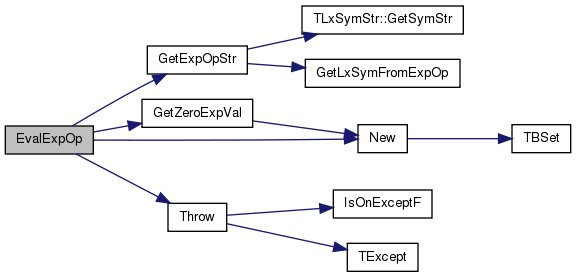

| int TExp::GetArgExps | ( | ) | const |
| TStr TExp::GetArgExpStr | ( | const int & | ArgExpN | ) | const |
| PExpHelpItem GetArgItem | ( | const int & | ArgItemN | ) | const |
| int GetArgItems | ( | ) | const |
| void TExp::GetBiDescV | ( | TStrPrV & | BiDescV | ) | [static] |
Definition at line 967 of file exp.cpp.
References TVec< TVal >::Add(), and TVec< TVal >::Clr().
{
BiDescV.Clr();
// constants
BiDescV.Add(TStrPr("True", "Logical 'True' == 1."));
BiDescV.Add(TStrPr("False", "Logical 'False' == 0."));
BiDescV.Add(TStrPr("E", "Nat. logarithm basis (2.7182...)."));
BiDescV.Add(TStrPr("Pi", "Constant pi (3.1415...)."));
// trigonometric funcions
BiDescV.Add(TStrPr("Sin(X)", "Sine of angle in radians."));
BiDescV.Add(TStrPr("Cos(X)", "Cosine of angle in radians."));
BiDescV.Add(TStrPr("Tan(X)", "Tangent of angle in radians."));
BiDescV.Add(TStrPr("ASin(X)", "Arc sine of (-1..+1)."));
BiDescV.Add(TStrPr("ACos(X)", "Arc cosine of (-1..+1)."));
BiDescV.Add(TStrPr("ATan(X)", "Arc tangent of (-inf..+inf)."));
BiDescV.Add(TStrPr("SinH(X)", "Hyperbolic sine."));
BiDescV.Add(TStrPr("CosH(X)", "Hyperbolic cosine."));
BiDescV.Add(TStrPr("TanH(X)", "Hyperbolic tangent."));
// exponential functions
BiDescV.Add(TStrPr("Pow(X, Y)", "X to the power of Y."));
BiDescV.Add(TStrPr("Exp(X)", "Exponential E to the power of X."));
BiDescV.Add(TStrPr("Sqr(X)", "X squared."));
BiDescV.Add(TStrPr("Sqrt(X)", "Positive square root."));
BiDescV.Add(TStrPr("Log(X)", "Natural logarithm."));
BiDescV.Add(TStrPr("Log10(X)", "Base 10 logarithm."));
// number manipulation functions
BiDescV.Add(TStrPr("Ceil(X)", "The smallest integer not less than X."));
BiDescV.Add(TStrPr("Floor(X)", "The largest integer not greater than X."));
BiDescV.Add(TStrPr("Int(X)", "Integer part of X."));
BiDescV.Add(TStrPr("Frac(X)", "Fractional part of X."));
BiDescV.Add(TStrPr("Abs(X)", "Absolute value of X."));
// random deviates
BiDescV.Add(TStrPr("UniDev()", "Uniform deviate (0..1)."));
BiDescV.Add(TStrPr("NrmDev()", "Normal deviate (0, 1)."));
BiDescV.Add(TStrPr("ExpDev()", "Exponential deviate."));
BiDescV.Add(TStrPr("GamDev(Order)", "Gamma deviate of Order."));
BiDescV.Add(TStrPr("PoiDev(Mean)", "Poisson deviate."));
BiDescV.Add(TStrPr("BinDev(Prb, Trials)", "Binomial deviate."));
// operators
BiDescV.Add(TStrPr("+N", "Unary plus."));
BiDescV.Add(TStrPr("-N", "Unary minus."));
BiDescV.Add(TStrPr("!L", "Not."));
BiDescV.Add(TStrPr("N1+N2", "Plus."));
BiDescV.Add(TStrPr("N1-N2", "Minus."));
BiDescV.Add(TStrPr("N1*N2", "Multiply."));
BiDescV.Add(TStrPr("N1/N2", "Division."));
BiDescV.Add(TStrPr("N1#N2", "Integer division."));
BiDescV.Add(TStrPr("N1%N2", "Modulo."));
BiDescV.Add(TStrPr("L1&L2", "And."));
BiDescV.Add(TStrPr("L1|L2", "Or."));
BiDescV.Add(TStrPr("E1=E2", "Equal."));
BiDescV.Add(TStrPr("E1<>E2", "Not equal."));
BiDescV.Add(TStrPr("E1<E2", "Less."));
BiDescV.Add(TStrPr("E1>E2", "Greater."));
BiDescV.Add(TStrPr("E1<=E2", "Less or equal."));
BiDescV.Add(TStrPr("E1>=E2", "Greater or equal."));
BiDescV.Add(TStrPr("L?E1:E2", "If L then return E1 else return E2."));
}

| void TExpHelp::GetCatNmV | ( | TStrV & | CatNmV | ) | const |
Definition at line 1126 of file exp.cpp.
References TVec< TVal >::AddUnique(), TVec< TVal >::Clr(), and TVec< TVal >::Ins().
{
CatNmV.Clr();
for (int ObjN=0; ObjN<ObjV.Len(); ObjN++){
TStr CatNm=ObjV[ObjN]->GetCatNm();
CatNmV.AddUnique(CatNm);
}
CatNmV.Ins(0, "All");
}

| TStr GetDescStr | ( | ) | const |
| TStr GetDfValStr | ( | ) | const |
| TExpOp TExp::GetExpOpFromLxSym | ( | const TLxSym & | LxSym | ) | [static, private] |
Definition at line 606 of file exp.cpp.
References eoAnd, eoDiv, eoEq, eoGEq, eoGtr, eoIDiv, eoIf, eoLEq, eoLss, eoMinus, eoMod, eoMul, eoNEq, eoNot, eoOr, eoPlus, eoUndef, Fail, syAmpersand, syAsterisk, syEq, syExclamation, syGEq, syGtr, syHash, syLEq, syLss, syMinus, syNEq, syPercent, syPlus, syQuestion, sySlash, and syVBar.
Referenced by LoadTxtAddExp(), LoadTxtExp(), LoadTxtMulExp(), and LoadTxtRelExp().
{
switch (LxSym){
case syPlus: return eoPlus;
case syMinus: return eoMinus;
case syAsterisk: return eoMul;
case sySlash: return eoDiv;
case syPercent: return eoMod;
case syExclamation: return eoNot;
case syVBar: return eoOr;
case syAmpersand: return eoAnd;
case syQuestion: return eoIf;
case syHash: return eoIDiv;
case syEq: return eoEq;
case syNEq: return eoNEq;
case syLss: return eoLss;
case syGtr: return eoGtr;
case syLEq: return eoLEq;
case syGEq: return eoGEq;
default: Fail; return eoUndef;
}
}

| static TStr GetExpOpStr | ( | const TExpOp & | ExpOp | ) | [static] |
Definition at line 264 of file exp.h.
References GetLxSymFromExpOp(), and TLxSymStr::GetSymStr().
Referenced by EvalExpOp(), and GetTopObjNm().
{
return TLxSymStr::GetSymStr(TExp::GetLxSymFromExpOp(ExpOp));}


| TStr TExp::GetExpTypeStr | ( | const TExpType & | ExpType | ) | [static] |
Definition at line 952 of file exp.cpp.
References etBiConst, etBiFunc, etFunc, etLst, etOp, etUndef, etVal, etVar, etVec, and Fail.
Referenced by EvalExp().
{
switch (ExpType){
case etUndef: return "Undef";
case etVal: return "Val";
case etVec: return "Vec";
case etLst: return "Lst";
case etOp: return "Op";
case etVar: return "Var";
case etBiConst: return "BiConst";
case etFunc: return "Func";
case etBiFunc: return "BiFunc";
default: Fail; return "";
}
}

| double GetFltVal | ( | ) | const |
Definition at line 48 of file exp.h.
References evtFlt, Flt, and GetValType().
Referenced by GetFltValAsInt().
{
if (GetValType()==evtFlt){return Flt;} else {return 0;}}


| int TExpVal::GetFltValAsInt | ( | const bool & | ThrowExceptP = true | ) | const |
Definition at line 62 of file exp.cpp.
References Flt, GetFltVal(), TInt::Mn, TInt::Mx, and Throw().
{
double Flt=GetFltVal();
if ((Flt<double(TInt::Mn))&&(double(TInt::Mx)<Flt)){
if (ThrowExceptP){TExcept::Throw("Float too big for integer.");}
else {Flt=0;}
}
return int(Flt);
}
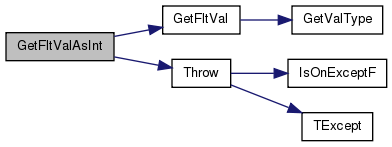
| virtual PExpVal GetFuncVal | ( | const TStr & | , |
| const TExpValV & | , | ||
| bool & | IsFunc | ||
| ) | [virtual] |
Definition at line 93 of file exp.h.
References GetUndefExpVal().
{
IsFunc=false; return TExpVal::GetUndefExpVal();}

| TStr TExpHelpObj::GetHdArgNmStr | ( | ) | const |
Definition at line 1032 of file exp.cpp.
References ArgItemV, ehotFunc, ehotOp, ehotTempl, ehotVar, Fail, and HdItem.
{
TChA ChA;
switch (Type){
case ehotOp: {// operator
TStr OpStr=HdItem->GetNm();
if (ArgItemV.Len()==1){
ChA+=OpStr; ChA+=" "; ChA+=ArgItemV[0]->GetNm();
} else
if (ArgItemV.Len()==2){
ChA+=ArgItemV[0]->GetNm();
ChA+=" "; ChA+=OpStr; ChA+=" ";
ChA+=ArgItemV[1]->GetNm();
} else
if (ArgItemV.Len()==3){
ChA+=ArgItemV[0]->GetNm();
ChA+=" "; ChA+=OpStr; ChA+=" ";
ChA+=ArgItemV[1]->GetNm();
ChA+=" "; ChA+=":"; ChA+=" ";
ChA+=ArgItemV[2]->GetNm();
} else {
Fail;
}
break;}
case ehotVar: // variable
ChA+=HdItem->GetNm(); break;
case ehotFunc: // function
ChA+=HdItem->GetTypeStr(); ChA+=" <- ";
ChA+=HdItem->GetNm();
ChA+="(";
{for (int ArgN=0; ArgN<ArgItemV.Len(); ArgN++){
if (ArgN>0){ChA+=", ";}
ChA+=ArgItemV[ArgN]->GetNm();
}}
ChA+=")";
break;
case ehotTempl: // template
ChA+=HdItem->GetTypeStr(); break;
default: Fail;
}
return ChA;
}
| PExpHelpItem GetHdItem | ( | ) | const |
| TLxSym TExp::GetLxSymFromExpOp | ( | const TExpOp & | ExpOp | ) | [static, private] |
Definition at line 628 of file exp.cpp.
References eoAnd, eoDiv, eoEq, eoGEq, eoGtr, eoIDiv, eoIf, eoLEq, eoLss, eoMinus, eoMod, eoMul, eoNEq, eoNot, eoOr, eoPlus, eoUMinus, eoUPlus, Fail, syAmpersand, syAsterisk, syEq, syExclamation, syGEq, syGtr, syHash, syLEq, syLss, syMinus, syNEq, syPercent, syPlus, syQuestion, sySlash, syUndef, and syVBar.
Referenced by GetExpOpStr(), and SaveTxtOp().
{
switch (ExpOp){
case eoUPlus: return syPlus;
case eoUMinus: return syMinus;
case eoNot: return syExclamation;
case eoPlus: return syPlus;
case eoMinus: return syMinus;
case eoMul: return syAsterisk;
case eoDiv: return sySlash;
case eoIDiv: return syHash;
case eoMod: return syPercent;
case eoAnd: return syAmpersand;
case eoOr: return syVBar;
case eoEq: return syEq;
case eoNEq: return syNEq;
case eoLss: return syLss;
case eoGtr: return syGtr;
case eoLEq: return syLEq;
case eoGEq: return syGEq;
case eoIf: return syQuestion;
default: Fail; return syUndef;
}
}

| PExpHelpObj TExpHelp::GetObj | ( | const TStr & | ObjNm | ) | const |
Definition at line 1146 of file exp.cpp.
References GetHdItem(), and TStr::GetUc().
{
PExpHelpObj Obj;
for (int ObjN=0; ObjN<ObjV.Len(); ObjN++){
if (ObjV[ObjN]->GetHdItem()->GetNm().GetUc()==ObjNm.GetUc()){
return ObjV[ObjN];}
}
return NULL;
}

| void TExpHelp::GetObjHdNmV | ( | const TStr & | CatNm, |
| TStrV & | ObjHdNmV | ||
| ) | const |
Definition at line 1135 of file exp.cpp.
References TVec< TVal >::AddUnique(), TVec< TVal >::Clr(), TStr::Empty(), and TVec< TVal >::Sort().
{
ObjHdNmV.Clr();
for (int ObjN=0; ObjN<ObjV.Len(); ObjN++){
TStr ObjCatNm=ObjV[ObjN]->GetCatNm();
TStr ObjHdNm=ObjV[ObjN]->GetHdItem()->GetNm();
if ((CatNm.Empty())||(CatNm=="All")||(CatNm==ObjCatNm)){
ObjHdNmV.AddUnique(ObjHdNm);}
}
ObjHdNmV.Sort();
}
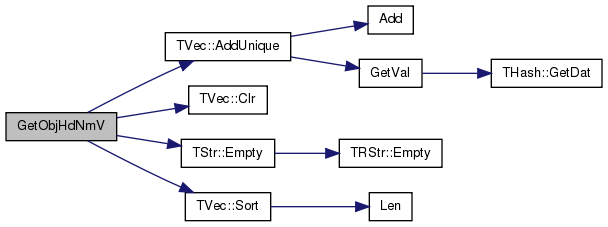
| TExpHelpObjType TExpHelpObj::GetObjTypeFromStr | ( | const TStr & | TypeStr | ) | [static] |
Definition at line 1074 of file exp.cpp.
References ehotFunc, ehotOp, ehotTempl, ehotUndef, ehotVar, and Throw().
{
if (TypeStr=="Op"){return ehotOp;}
else if (TypeStr=="Var"){return ehotVar;}
else if (TypeStr=="Func"){return ehotFunc;}
else if (TypeStr=="Templ"){return ehotTempl;}
else {TExcept::Throw("Invalid object type.", TypeStr); return ehotUndef;}
}

Definition at line 97 of file exp.h.
Referenced by TVec< THKeyDat >::GetPivotValNCmp().
{return Rnd;}

Definition at line 51 of file exp.h.
References evtStr, GetValType(), IAssert, and Str.
{IAssert(GetValType()==evtStr); return Str;}

| TStr TExp::GetTopObjNm | ( | ) | const |
Definition at line 872 of file exp.cpp.
References etBiConst, etBiFunc, etFunc, etOp, etVar, ExpNm, ExpOp, ExpType, and GetExpOpStr().
{
TStr TopObjNm;
TExpType _ExpType=TExpType(int(ExpType));
switch (_ExpType){
case etOp:{
TExpOp _ExpOp=TExpOp(int(ExpOp));
TopObjNm=GetExpOpStr(_ExpOp);
break;}
case etVar:
case etBiConst:
case etFunc:
case etBiFunc:{
TopObjNm=ExpNm; break;}
default: break;
}
return TopObjNm;
}

| TExpHelpObjType GetType | ( | ) | const |
Definition at line 333 of file exp.h.
{return TExpHelpObjType(int(Type));}
| TStr GetTypeStr | ( | ) | const |
Definition at line 298 of file exp.h.
References TypeStr.
Referenced by TStdNotify::OnNotify(), and TStdErrNotify::OnNotify().
{return TypeStr;}

| PExpVal TExpVal::GetUndefExpVal | ( | ) | [static] |
Definition at line 123 of file exp.cpp.
References New().
Referenced by Eval(), EvalExp(), GetFuncVal(), GetVarVal(), and TExpBi::TExpBi().
{
if (UndefExpVal.Empty()){
UndefExpVal=TExpVal::New();}
return UndefExpVal;
}

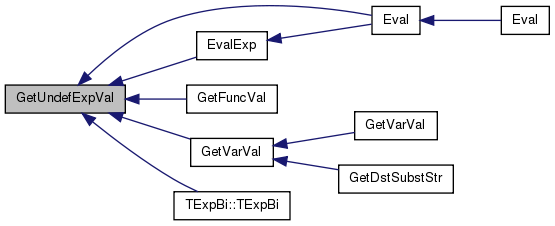
| TExpValType GetValType | ( | ) | const |
Definition at line 43 of file exp.h.
References ValType.
Referenced by GetFltVal(), GetStrVal(), IsFltVal(), and IsFuncOk().
{return TExpValType(int(ValType));}
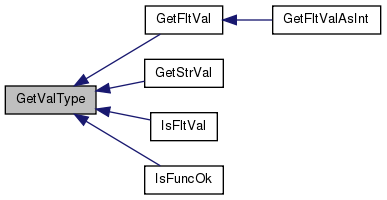
| virtual void GetVarNmVal | ( | const int & | , |
| TStr & | , | ||
| PExpVal & | |||
| ) | const [virtual] |
Definition at line 85 of file exp.h.
References GetUndefExpVal().
Referenced by GetDstSubstStr(), and GetVarVal().
{
IsVar=false; return TExpVal::GetUndefExpVal();}


Definition at line 87 of file exp.h.
References GetVarVal().
{
bool IsVar; return GetVarVal(VarNm, IsVar);}

| PExpVal TExpVal::GetZeroExpVal | ( | ) | [static] |
Definition at line 129 of file exp.cpp.
References New(), and ZeroExpVal.
Referenced by EvalExpOp().
{
if (ZeroExpVal.Empty()){
ZeroExpVal=TExpVal::New(double(0));}
return ZeroExpVal;
}


| static bool IsExpStrOk | ( | const TStr & | ExpStr, |
| TStr & | MsgStr | ||
| ) | [static] |
Definition at line 44 of file exp.h.
References evtFlt, Flt, and GetValType().
{
if (GetValType()==evtFlt){_Flt=Flt; return true;} else {return false;}}

| bool IsFltVal | ( | double & | _Flt | ) | const |
Definition at line 46 of file exp.h.
References evtFlt, Flt, and GetValType().
{
if (GetValType()==evtFlt){_Flt=Flt; return true;} else {return false;}}

| bool TExpEnv::IsFuncOk | ( | const TStr & | RqFuncNm, |
| const TExpFuncArgType & | RqFuncArgType, | ||
| const TStr & | FuncNm, | ||
| const TExpValV & | ArgValV | ||
| ) | [static] |
Definition at line 137 of file exp.cpp.
References efatFlt, efatFltFlt, efatFltStr, efatStr, efatStrAny, efatStrFlt, efatStrStr, efatVoid, evtFlt, evtStr, Fail, TStr::GetUc(), and GetValType().
{
if (RqFuncNm.GetUc()!=FuncNm.GetUc()){return false;}
switch (RqFuncArgType){
case efatVoid: return ArgValV.Len()==0;
case efatFlt:
if (ArgValV.Len()!=1){return false;}
if (ArgValV[0]->GetValType()!=evtFlt){return false;}
return true;
case efatStr:
if (ArgValV.Len()!=1){return false;}
if (ArgValV[0]->GetValType()!=evtStr){return false;}
return true;
case efatFltFlt:
if (ArgValV.Len()!=2){return false;}
if (ArgValV[0]->GetValType()!=evtFlt){return false;}
if (ArgValV[1]->GetValType()!=evtFlt){return false;}
return true;
case efatFltStr:
if (ArgValV.Len()!=2){return false;}
if (ArgValV[0]->GetValType()!=evtFlt){return false;}
if (ArgValV[1]->GetValType()!=evtStr){return false;}
return true;
case efatStrFlt:
if (ArgValV.Len()!=2){return false;}
if (ArgValV[0]->GetValType()!=evtStr){return false;}
if (ArgValV[1]->GetValType()!=evtFlt){return false;}
return true;
case efatStrStr:
if (ArgValV.Len()!=2){return false;}
if (ArgValV[0]->GetValType()!=evtStr){return false;}
if (ArgValV[1]->GetValType()!=evtStr){return false;}
return true;
case efatStrAny:
if (ArgValV.Len()!=2){return false;}
if (ArgValV[0]->GetValType()!=evtStr){return false;}
return true;
default: Fail; return false;
}
}

| PExpVal TExp::LoadAndEvalExpL | ( | const TStr & | ExpLStr, |
| bool & | Ok, | ||
| TStr & | MsgStr, | ||
| const PExpEnv & | ExpEnv = TExpEnv::DfExpEnv |
||
| ) | [static] |
Definition at line 918 of file exp.cpp.
References etUndef, ExpExpect, ExpVal, TILx::GetSym(), iloCmtAlw, iloCsSens, iloExcept, LoadTxtExp(), TStrIn::New(), syEof, TILx::Sym, sySemicolon, and TExp().
{
// create final expression value
PExpVal ExpVal;
// transform exp. str. to input stream
PSIn SIn=TStrIn::New(ExpLStr);
// create lexical
TILx Lx(SIn, TFSet()|iloCmtAlw|iloCsSens|iloExcept);
TFSet Expect=TFSet()|sySemicolon|syEof;
// load & evaluate expression separated by semicolon
while (Lx.Sym!=syEof){
// create expression
PExp Exp; Ok=true; MsgStr="Ok";
try {
Lx.GetSym(ExpExpect);
Exp=LoadTxtExp(Lx, Expect);
}
catch (PExcept Except){
Ok=false; MsgStr=Except->GetMsgStr();
Exp=PExp(new TExp(etUndef));
}
// evaluate expression
if (Ok){
ExpVal=Exp->Eval(Ok, MsgStr, ExpEnv);
//printf("%s\n", ExpVal->GetStr().CStr());
if (!Ok){
return NULL;}
} else {
return NULL;
}
}
return ExpVal;
}
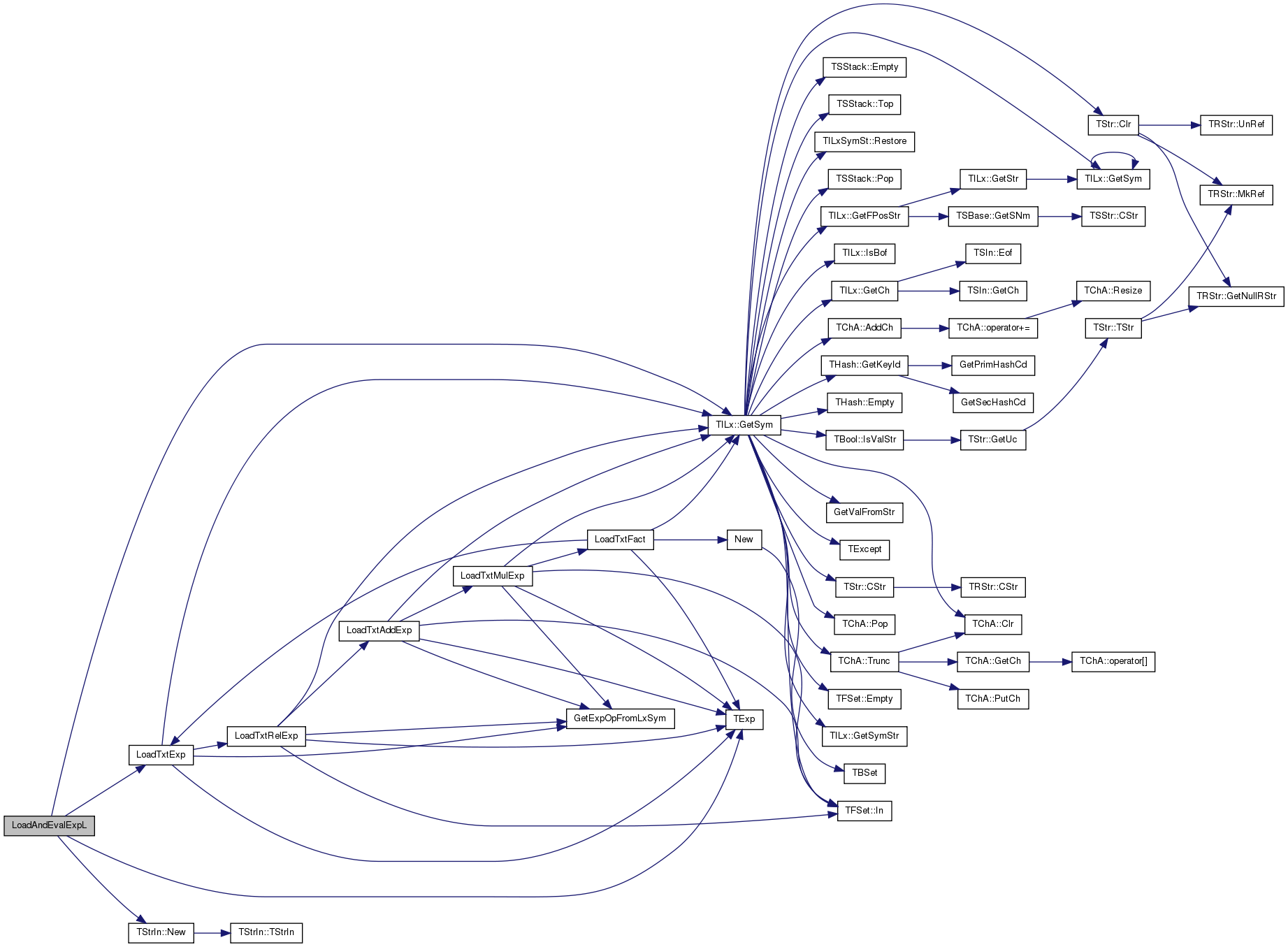
| static PExp LoadTxt | ( | const PSIn & | SIn, |
| bool & | Ok, | ||
| TStr & | MsgStr, | ||
| const TFSet & | Expect = TFSet()|syEof |
||
| ) | [static] |
Referenced by TILx::GetVarSecTm(), IsExpStrOk(), IsXLoadFromFileOk(), TTimeNet::LoadBipartite(), LoadStr(), TGnuPlot::LoadTs(), LoadTxt(), and TPreproc::TPreproc().
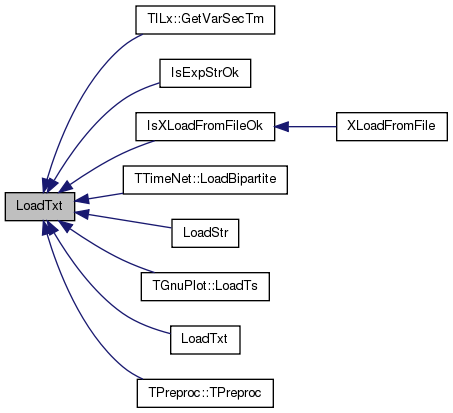
Definition at line 236 of file exp.h.
References LoadTxt(), and TStrIn::New().
{
PSIn SIn=TStrIn::New(ExpStr); return LoadTxt(SIn, Ok, MsgStr);}

| PExp TExp::LoadTxtAddExp | ( | TILx & | Lx, |
| const TFSet & | Expect | ||
| ) | [static, private] |
Definition at line 704 of file exp.cpp.
References AddOpSymSet, eoUMinus, eoUndef, eoUPlus, ExpOp, GetExpOpFromLxSym(), TILx::GetSym(), TFSet::In(), LoadTxtMulExp(), MulExpExpect, TILx::Sym, syMinus, syPlus, and TExp().
Referenced by LoadTxtRelExp().
{
TExpOp PrefExpOp=eoUndef;
if (Lx.Sym==syPlus){PrefExpOp=eoUPlus; Lx.GetSym(MulExpExpect);}
else if (Lx.Sym==syMinus){PrefExpOp=eoUMinus; Lx.GetSym(MulExpExpect);}
PExp Exp=LoadTxtMulExp(Lx, TFSet(Expect)|AddOpSymSet);
if (PrefExpOp!=eoUndef){
Exp=PExp(new TExp(PrefExpOp, Exp));}
while (AddOpSymSet.In(Lx.Sym)){
TExpOp ExpOp=GetExpOpFromLxSym(Lx.Sym);
Lx.GetSym(MulExpExpect);
PExp RExp=LoadTxtMulExp(Lx, TFSet(Expect)|AddOpSymSet);
Exp=PExp(new TExp(ExpOp, Exp, RExp));
}
return Exp;
}
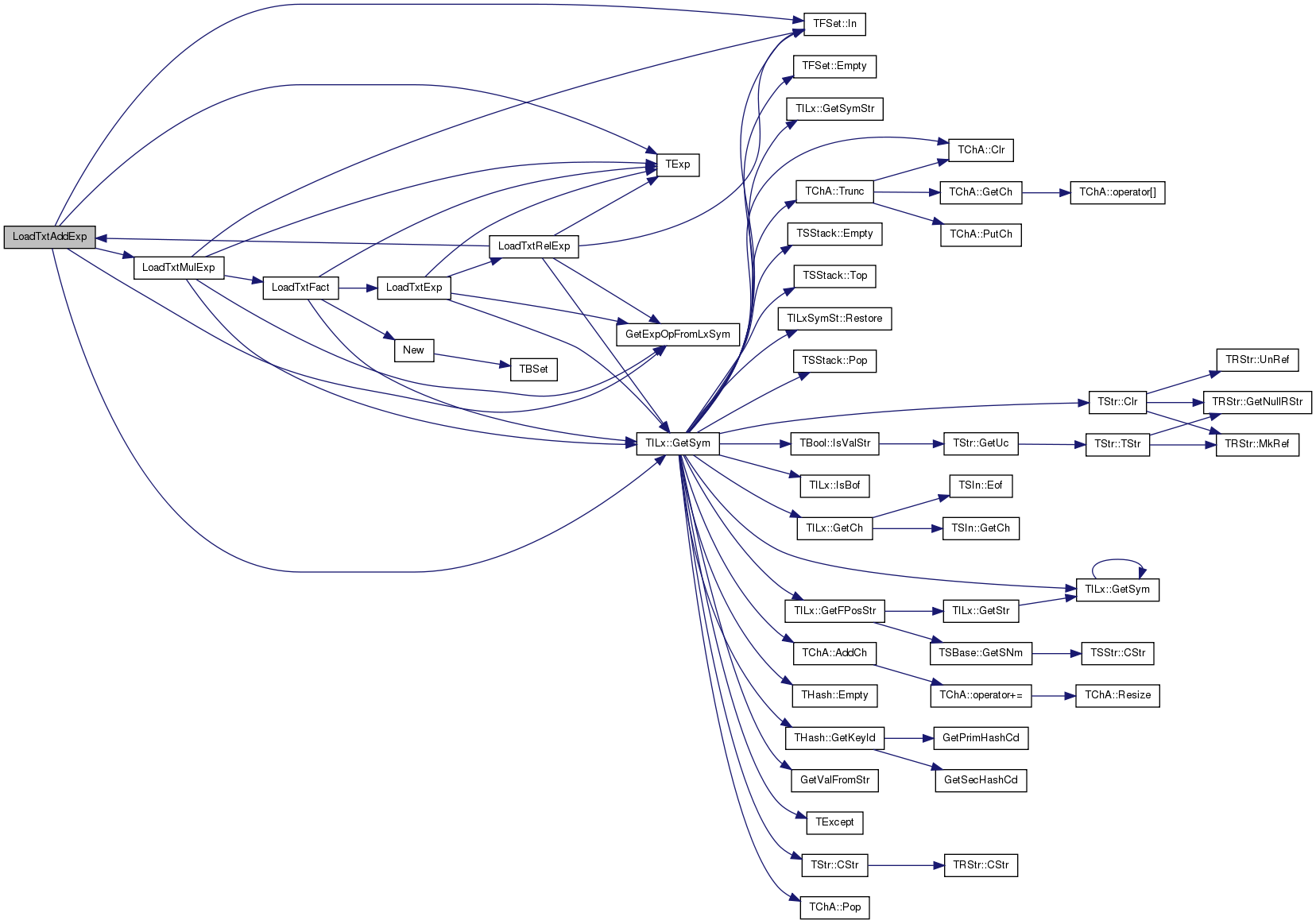

| PExp TExp::LoadTxtExp | ( | TILx & | Lx, |
| const TFSet & | Expect | ||
| ) | [static, private] |
Definition at line 731 of file exp.cpp.
References ExpExpect, ExpOp, GetExpOpFromLxSym(), TILx::GetSym(), LoadTxtRelExp(), syColon, TILx::Sym, syQuestion, and TExp().
Referenced by LoadAndEvalExpL(), and LoadTxtFact().
{
PExp Exp=LoadTxtRelExp(Lx, TFSet(Expect)|syQuestion);
if (Lx.Sym==syQuestion){
TExpOp ExpOp=GetExpOpFromLxSym(Lx.Sym);
Lx.GetSym(ExpExpect);
PExp ThenExp=LoadTxtExp(Lx, TFSet()|syColon);
Lx.GetSym(ExpExpect);
PExp ElseExp=LoadTxtExp(Lx, Expect);
Exp=PExp(new TExp(ExpOp, Exp, ThenExp, ElseExp));
}
return Exp;
}
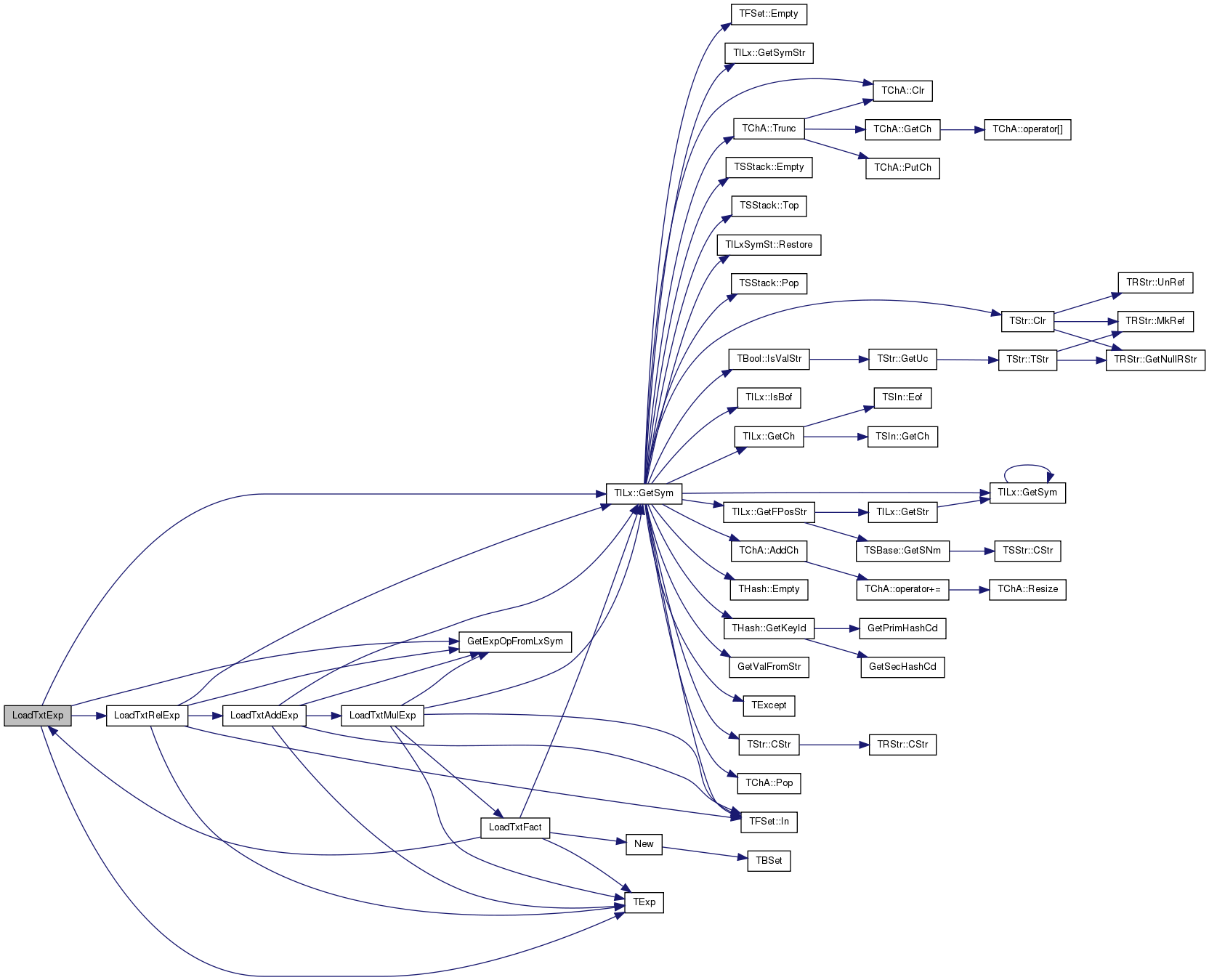

| PExp TExp::LoadTxtFact | ( | TILx & | Lx, |
| const TFSet & | Expect | ||
| ) | [static, private] |
Definition at line 652 of file exp.cpp.
References ArgExpV, ExpExpect, ExpNm, Fail, TILx::Flt, TILx::GetSym(), LoadTxtExp(), New(), TILx::Str, syComma, syFlt, syIdStr, syLParen, TILx::Sym, syQStr, syRParen, and TExp().
Referenced by LoadTxtMulExp().
{
PExp Exp;
switch (Lx.Sym){
case syFlt:{
PExpVal ExpVal=TExpVal::New(Lx.Flt);
Exp=PExp(new TExp(ExpVal));
Lx.GetSym(Expect);
break;}
case syIdStr:{
TStr ExpNm=Lx.Str;
Lx.GetSym(TFSet(Expect)|syLParen);
if (Lx.Sym==syLParen){
TExpV ArgExpV;
Lx.GetSym(TFSet(ExpExpect)|syRParen);
while (Lx.Sym!=syRParen){
if (Lx.Sym==syComma){Lx.GetSym(ExpExpect);}
PExp ArgExp=LoadTxtExp(Lx, TFSet()|syComma|syRParen);
ArgExpV.Add(ArgExp);
}
Lx.GetSym(Expect);
Exp=PExp(new TExp(ExpNm, ArgExpV));
} else {
Exp=PExp(new TExp(ExpNm));
}
break;}
case syQStr:{
PExpVal ExpVal=TExpVal::New(Lx.Str);
Exp=PExp(new TExp(ExpVal));
Lx.GetSym(Expect);
break;}
case syLParen:{
Lx.GetSym(ExpExpect);
Exp=LoadTxtExp(Lx, TFSet()|syRParen);
Exp->IsParen=true;
Lx.GetSym(Expect);
break;}
default: Fail;
}
return Exp;
}
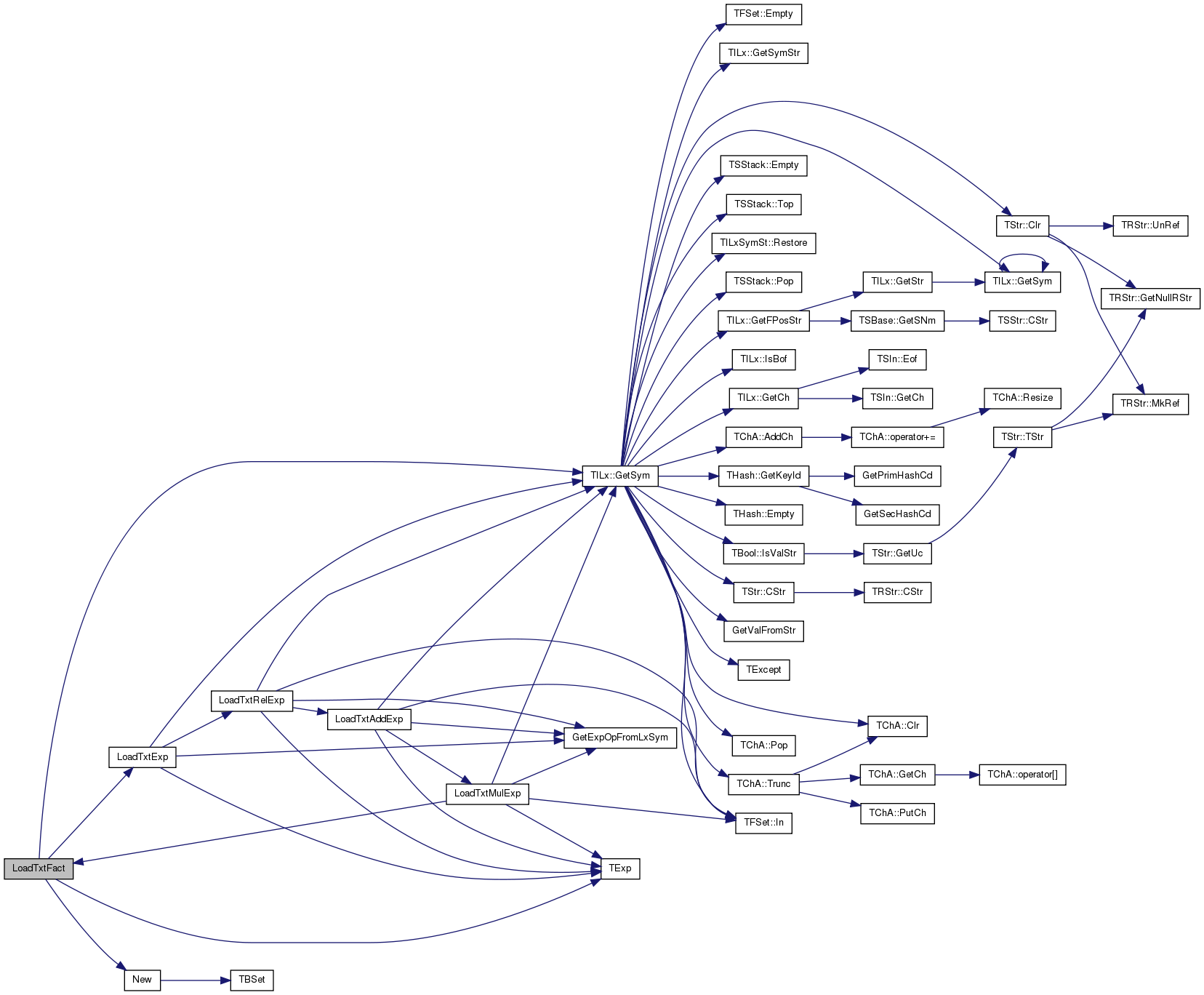

| PExp TExp::LoadTxtMulExp | ( | TILx & | Lx, |
| const TFSet & | Expect | ||
| ) | [static, private] |
Definition at line 693 of file exp.cpp.
References ExpOp, FactExpExpect, GetExpOpFromLxSym(), TILx::GetSym(), TFSet::In(), LoadTxtFact(), MulOpSymSet, TILx::Sym, and TExp().
Referenced by LoadTxtAddExp().
{
PExp Exp=LoadTxtFact(Lx, TFSet(Expect)|MulOpSymSet);
while (MulOpSymSet.In(Lx.Sym)){
TExpOp ExpOp=GetExpOpFromLxSym(Lx.Sym);
Lx.GetSym(FactExpExpect);
PExp RExp=LoadTxtFact(Lx, TFSet(Expect)|MulOpSymSet);
Exp=PExp(new TExp(ExpOp, Exp, RExp));
}
return Exp;
}
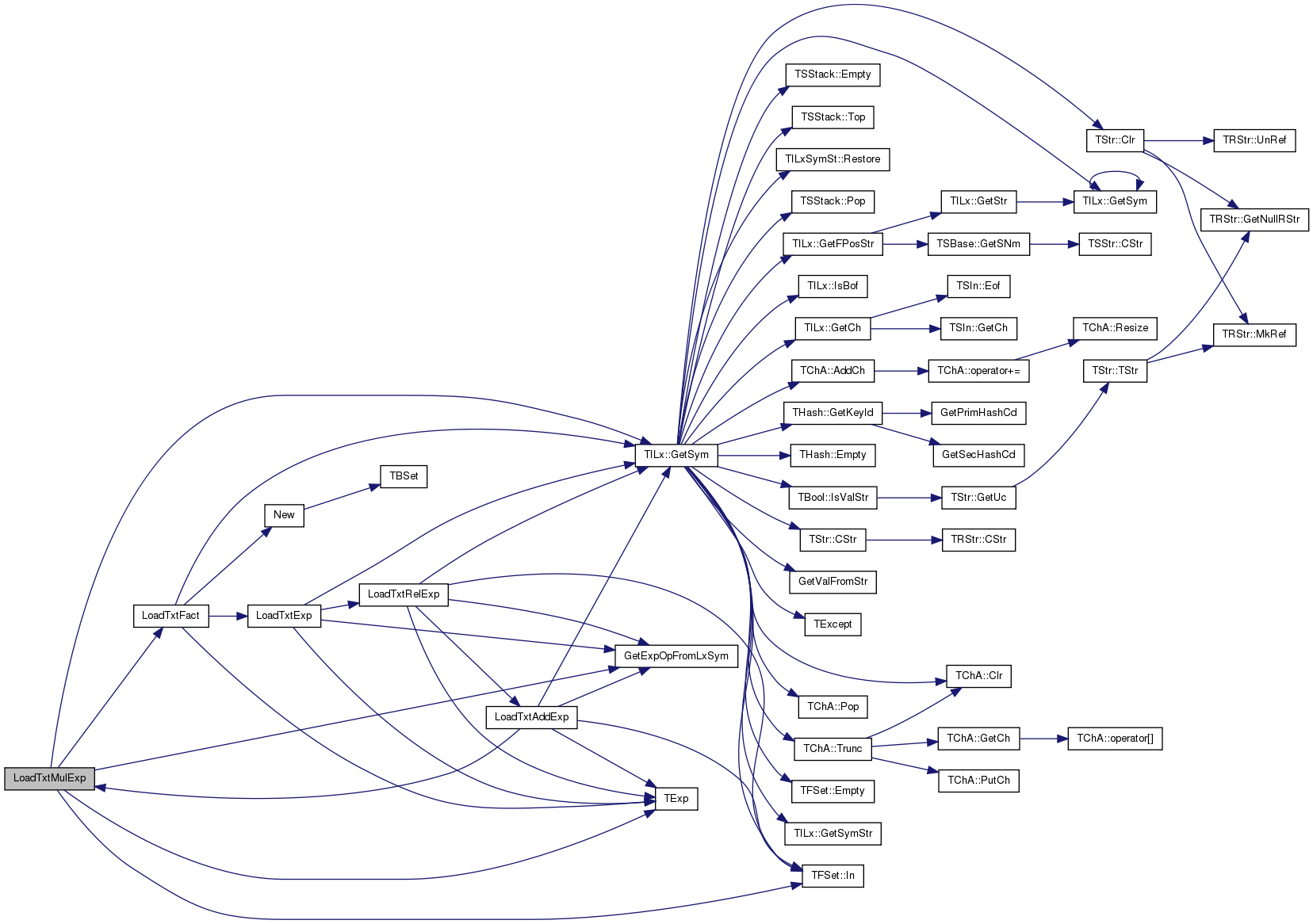

| PExp TExp::LoadTxtRelExp | ( | TILx & | Lx, |
| const TFSet & | Expect | ||
| ) | [static, private] |
Definition at line 720 of file exp.cpp.
References AddExpExpect, ExpOp, GetExpOpFromLxSym(), TILx::GetSym(), TFSet::In(), LoadTxtAddExp(), RelOpSymSet, TILx::Sym, and TExp().
Referenced by LoadTxtExp().
{
PExp Exp=LoadTxtAddExp(Lx, TFSet(Expect)|RelOpSymSet);
if (RelOpSymSet.In(Lx.Sym)){
TExpOp ExpOp=GetExpOpFromLxSym(Lx.Sym);
Lx.GetSym(AddExpExpect);
PExp RExp=LoadTxtAddExp(Lx, Expect);
Exp=PExp(new TExp(ExpOp, Exp, RExp));
}
return Exp;
}
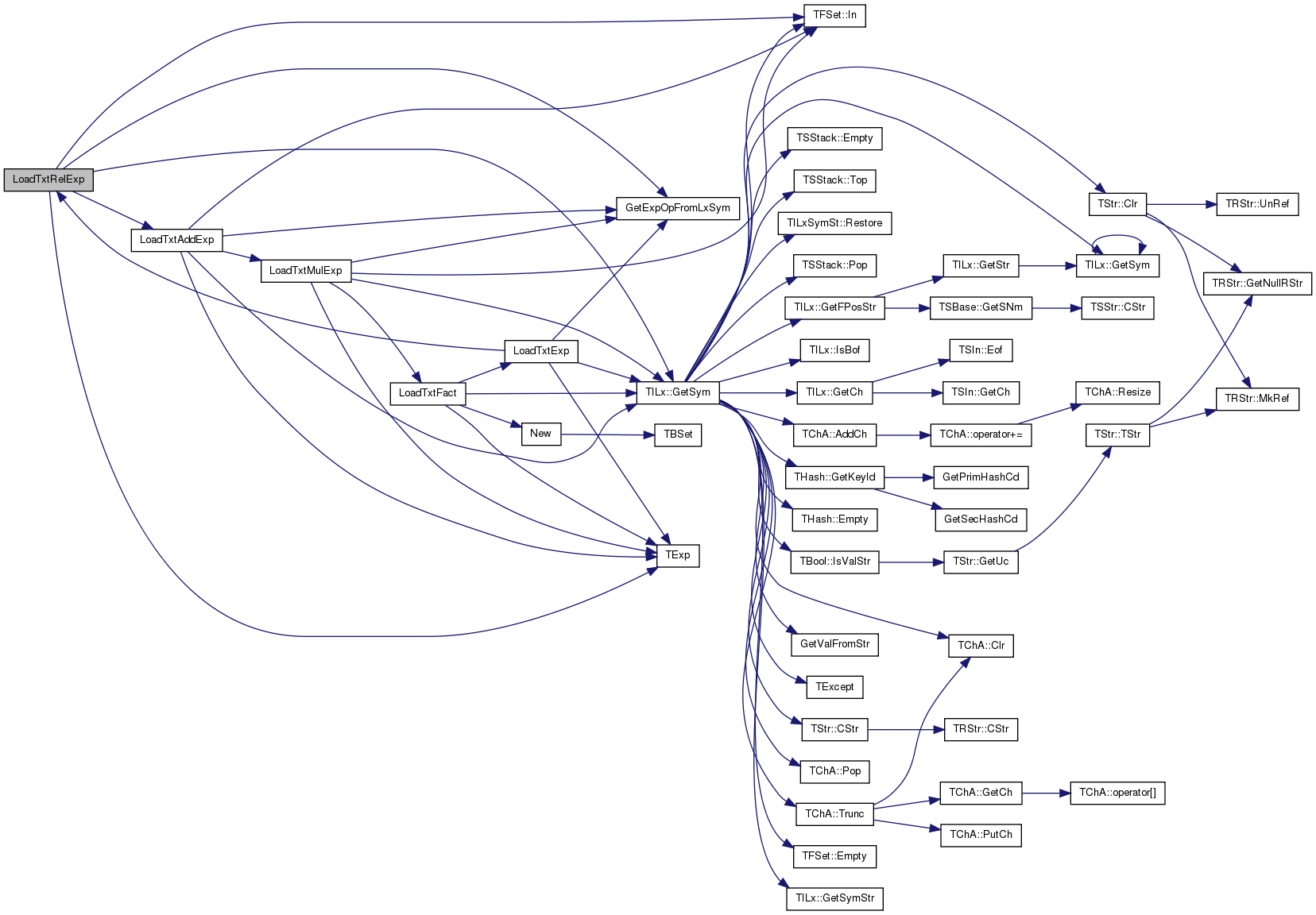

| static PExpVal MkClone | ( | const PExpVal & | ExpVal | ) | [static] |
| static PExpVal New | ( | const TExpValType & | ValType = evtUndef | ) | [static] |
| static PExpVal New | ( | const double & | Flt | ) | [static] |
| static PExpHelpItem New | ( | const TStr & | Nm, |
| const TStr & | TypeStr, | ||
| const TStr & | DescStr, | ||
| const TStr & | DfValStr | ||
| ) | [static] |
Definition at line 282 of file exp.h.
References TExpHelpItem().
{
return PExpHelpItem(new TExpHelpItem(Nm, TypeStr, DescStr, DfValStr));}

| static PExpHelpObj New | ( | const TExpHelpObjType & | Type, |
| const TStr & | CatNm, | ||
| const PExpHelpItem & | HdItem, | ||
| const TExpHelpItemV & | ArgItemV = TExpHelpItemV() |
||
| ) | [static] |
Definition at line 318 of file exp.h.
References ArgItemV, and TExpHelpObj().
{
return PExpHelpObj(new TExpHelpObj(Type, CatNm, HdItem, ArgItemV));}

| static PExpHelp New | ( | ) | [static] |
Definition at line 354 of file exp.h.
References TExpHelp().
{return PExpHelp(new TExpHelp());}

| bool operator< | ( | const TExpVal & | ExpVal | ) | const |
| TExpHelpItem& operator= | ( | const TExpHelpItem & | ) |
| TExpHelpObj& operator= | ( | const TExpHelpObj & | ) |
| bool operator== | ( | const TExpVal & | ExpVal | ) | const |
| bool operator== | ( | const TExpEnv & | ) | const |
| bool operator== | ( | const TExp & | ) | const |
| bool operator== | ( | const TExpHelpItem & | ) | const |
| bool operator== | ( | const TExpHelpObj & | ) | const |
| bool operator== | ( | const TExpHelp & | ) | const |
| void TExp::SaveTxtOp | ( | TOLx & | Lx | ) | const [private] |
Definition at line 744 of file exp.cpp.
References ArgExpV, eoAnd, eoDiv, eoEq, eoGEq, eoGtr, eoIDiv, eoIf, eoLEq, eoLss, eoMinus, eoMod, eoMul, eoNEq, eoNot, eoOr, eoPlus, eoUMinus, eoUPlus, etOp, ExpOp, ExpType, Fail, GetLxSymFromExpOp(), IAssert, TOLx::PutSym(), and syColon.
{
IAssert(TExpType(static_cast<int>(ExpType))==etOp);
TExpOp _ExpOp=TExpOp(int(ExpOp));
TLxSym OpSym=GetLxSymFromExpOp(_ExpOp);
switch (_ExpOp){
case eoUPlus:
case eoUMinus:
case eoNot:
Lx.PutSym(OpSym); ArgExpV[0]->SaveTxt(Lx);
break;
case eoPlus: case eoMinus:
case eoMul: case eoDiv:
case eoIDiv: case eoMod:
case eoAnd: case eoOr:
case eoEq: case eoNEq:
case eoLss: case eoGtr:
case eoLEq: case eoGEq:
ArgExpV[0]->SaveTxt(Lx); Lx.PutSym(OpSym); ArgExpV[1]->SaveTxt(Lx);
break;
case eoIf:
ArgExpV[0]->SaveTxt(Lx); Lx.PutSym(OpSym);
ArgExpV[1]->SaveTxt(Lx); Lx.PutSym(syColon); ArgExpV[2]->SaveTxt(Lx);
break;
default: Fail;
}
}

Definition at line 211 of file exp.h.
Referenced by LoadAndEvalExpL(), LoadTxtAddExp(), LoadTxtExp(), LoadTxtFact(), LoadTxtMulExp(), and LoadTxtRelExp().

| TExp::TExp | ( | const TExpOp & | _ExpOp, |
| const PExp & | Exp1, | ||
| const PExp & | Exp2 = NULL, |
||
| const PExp & | Exp3 = NULL |
||
| ) |
| TExp::TExp | ( | const PExpVal & | _ExpVal | ) |
| TExp::TExp | ( | const TStr & | _VarNm | ) |
| TExp::TExp | ( | const TStr & | _FuncNm, |
| const TExpV & | _ArgExpV | ||
| ) |
| TExpHelp | ( | ) |
| TExpHelpItem | ( | ) |
| TExpHelpItem | ( | const TStr & | _Nm, |
| const TStr & | _TypeStr, | ||
| const TStr & | _DescStr, | ||
| const TStr & | _DfValStr | ||
| ) |
| TExpHelpItem | ( | TSIn & | SIn | ) |
| TExpHelpObj | ( | ) |
| TExpHelpObj | ( | const TExpHelpObjType & | _Type, |
| const TStr & | _CatNm, | ||
| const PExpHelpItem & | _HdItem, | ||
| const TExpHelpItemV & | _ArgItemV | ||
| ) |
| TExpHelpObj | ( | TSIn & | SIn | ) |
| TExpVal | ( | const TExpValType & | _ValType = evtUndef | ) |
| TExpVal | ( | const double & | _Flt | ) |
| ~TExpHelpItem | ( | ) |
| ~TExpHelpObj | ( | ) |
const TFSet TExp::AddExpExpect [static] |
Definition at line 196 of file exp.h.
Referenced by LoadTxtRelExp().
const TFSet TExp::AddOpSymSet [static] |
Definition at line 195 of file exp.h.
Referenced by LoadTxtAddExp().
| TExpV ArgExpV |
Definition at line 193 of file exp.h.
Referenced by EvalExp(), EvalExpOp(), GetArgExps(), GetArgExpStr(), LoadTxtFact(), SaveTxtOp(), and TExp().
| TExpHelpItemV ArgItemV |
Definition at line 312 of file exp.h.
Referenced by GetArgItem(), GetArgItems(), GetHdArgNmStr(), and New().
| ClassTPV (TExpHelpObj, PExpHelpObj, TExpHelpObjV) private TStr CatNm |
Definition at line 307 of file exp.h.
Referenced by GetCatNm().
Definition at line 275 of file exp.h.
Referenced by GetDescStr().
PExpEnv TExpEnv::DfExpEnv = PExpEnv(new TExpEnv()) [static] |
Definition at line 276 of file exp.h.
Referenced by GetDfValStr().
Definition at line 192 of file exp.h.
Referenced by EvalExp(), TExpBi::IsExpBiId(), and TExp().
const TFSet TExp::ExpExpect [static] |
Definition at line 197 of file exp.h.
Referenced by LoadAndEvalExpL(), LoadTxtExp(), and LoadTxtFact().
Definition at line 190 of file exp.h.
Referenced by EvalExp(), GetTopObjNm(), LoadTxtFact(), and TExp().
Definition at line 191 of file exp.h.
Referenced by EvalExpOp(), GetTopObjNm(), LoadTxtAddExp(), LoadTxtExp(), LoadTxtMulExp(), LoadTxtRelExp(), and SaveTxtOp().
Definition at line 184 of file exp.h.
Referenced by EvalExp(), GetTopObjNm(), SaveTxtOp(), and TExp().
| PExpVal ExpVal |
Definition at line 189 of file exp.h.
Referenced by Eval(), EvalExp(), EvalExpOp(), TExpBi::GetBiFuncVal(), and LoadAndEvalExpL().
const TFSet TExp::FactExpExpect [static] |
Definition at line 196 of file exp.h.
Referenced by LoadTxtMulExp().
Definition at line 12 of file exp.h.
Referenced by TFlt::Abs(), EvalExpOp(), GetFltVal(), GetFltValAsInt(), IsFltVal(), TFlt::operator!=(), TSFlt::operator!=(), TFlt::operator*=(), TFlt::operator+=(), TFlt::operator-=(), TFlt::operator/=(), TFlt::operator=(), TFlt::operator==(), TSFlt::operator==(), and Save().
| PExpHelpItem HdItem |
Definition at line 311 of file exp.h.
Referenced by GetHdArgNmStr(), and GetHdItem().
const TFSet TExp::MulExpExpect [static] |
Definition at line 196 of file exp.h.
Referenced by LoadTxtAddExp().
const TFSet TExp::MulOpSymSet [static] |
Definition at line 195 of file exp.h.
Referenced by LoadTxtMulExp().
const TFSet TExp::RelExpExpect [static] |
const TFSet TExp::RelOpSymSet [static] |
Definition at line 195 of file exp.h.
Referenced by LoadTxtRelExp().
Definition at line 13 of file exp.h.
Referenced by AddTokToChA(), TStr::DelSubStr(), EvalExpOp(), GetAbs(), GetAbsFromBase(), TStrHash< TDat, TStringPool, THashFunc >::GetDatKeyPrV(), TUrlLx::GetDigits(), TZipIn::GetFLen(), TStr::GetFNmStr(), TUrlLx::GetHost(), TUrlLx::GetHostPort(), TUrlLx::GetHPath(), TStrHash< TDat, TStringPool, THashFunc >::GetKeyDatPrV(), TUrlLx::GetScheme(), TStrUtil::GetShorStr(), TUStr::GetStarterLowerCaseStr(), TUStr::GetStarterStr(), TUStr::GetStr(), TUrlLx::GetStr(), GetStr(), TStr::GetStr(), GetStrVal(), TStr::GetSubStr(), GetTagNm(), TUrlLx::GetToCh(), GetUrlSearchStr(), GetXmlStr(), TStr::InsStr(), IsTag(), TXmlLx::IsTagNm(), PutStr(), TOLx::PutSym(), Save(), and TFlt::TFlt().
| ClassTPV (TExpHelpItem, PExpHelpItem, TExpHelpItemV) private TStr TypeStr |
Definition at line 271 of file exp.h.
Referenced by GetTypeStr(), TStdNotify::OnNotify(), and TStdErrNotify::OnNotify().
const TFSet TExp::UAddOpSymSet [static] |
| TExpValL ValL |
Definition at line 15 of file exp.h.
Referenced by AddToLst(), and Save().
Definition at line 11 of file exp.h.
Referenced by AddToLst(), AddToVec(), GetValType(), New(), and Save().
| TExpValV ValV |
Definition at line 14 of file exp.h.
Referenced by AddToArr(), AddToVec(), TVecPool< TVal >::CompactPool(), TMAGAffMtx::Dump(), TKronMtx::Dump(), TTuple< TVal, NVals >::FindMn(), TTuple< TVal, NVals >::FindMx(), TSnap::GenGeoPrefAttach(), GetArrVal(), GetArrVals(), TEnv::GetIfArgPrefixIntV(), TVVec< TVal >::GetMxValXY(), GetTagVal(), TBigNet< TNodeData, IsDir >::IsOk(), TGStatVec::Plot(), TGnuPlot::PlotValV(), Save(), TGnuPlot::SaveTs(), TTuple< TVal, NVals >::Sort(), and TVVec< TVal >::Swap().
PExpVal TExpVal::ZeroExpVal = NULL [static] |
Definition at line 7 of file exp.h.
Referenced by GetZeroExpVal().